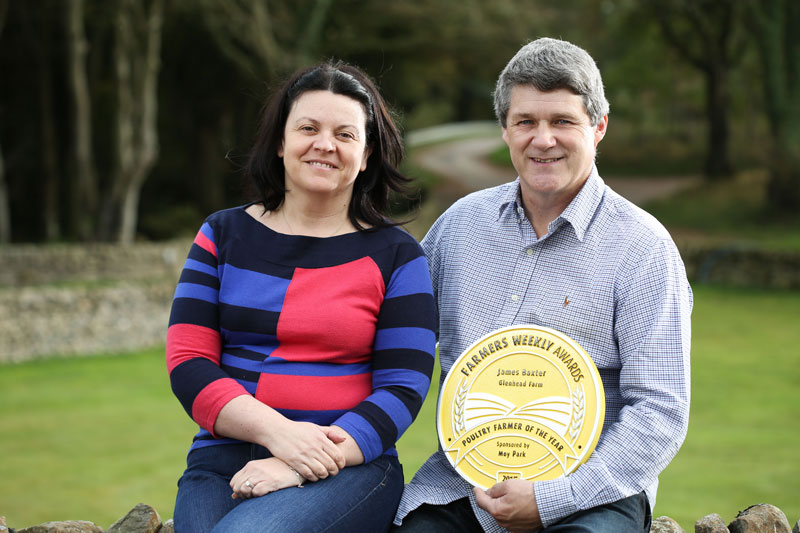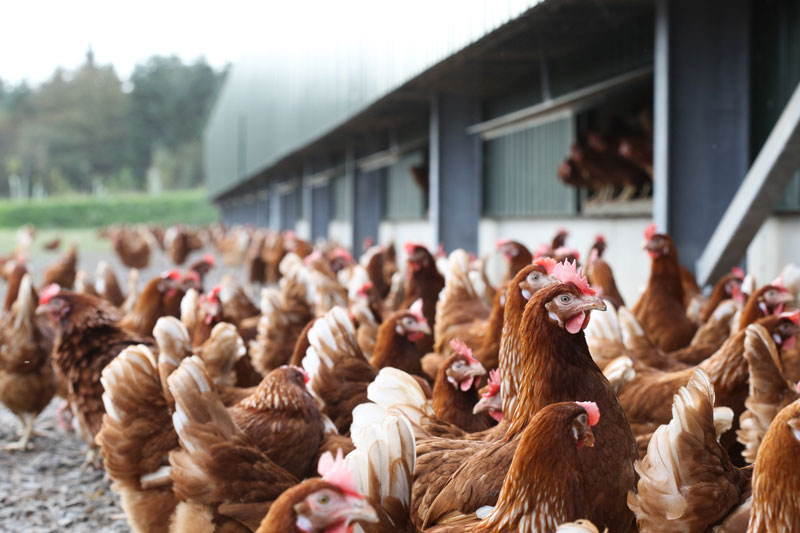
Free range egg producer James Baxter is looking to double the number of birds on his family farm near Stranraer in the West of Scotland.
James, who is vice chairman of the British Free Range Egg producers’ Association (BFREPA), was recently named Poultry Farmer of the Year at the Farmers Weekly awards ceremony at the Grosvenor House Hotel in London. The Scottish farmer pipped Daniel Fairburn of L J Fairburn and Dan Wood of Blackacre Farm to the national accolade – impressing the judges with his “do-it-yourself” approach to egg production. James is now pressing ahead with expansion plans.
“We will be looking to double up what we have got,” said James, who currently has 64,000 layers – all in multi-tier units. The first units were erected in 2010 – two 16,000-bird units housed in a single building and divided down the middle. The total £1.3 million investment was made with aid from the Scottish Rural Development Programme, although James said that plans were already well advanced when the Government grants became available. “I have never had any subsidy in my life, so I quite enjoyed getting some grant for a change,” he said.
Another 16,000-bird multi-tier unit was erected in 2012 – this time a single unit. “It is more expensive to build a single unit, but there are benefits,” said James. “You get better ventilation, better control over the hens and better hen health and better bio-security. You are probably looking at £50,000 more to build a single unit, but there are a number of advantages and it can lead to better eggs.” Another single 16,000-bird unit was erected on the farm in 2014, taking overall bird numbers to the current level of 64,000. Work is already under way on additional units.

“We have started work on building another two 16,000-bird sheds. We are on with the ground work. They should be ready in 2016. I am hoping to double current numbers – to 128,000. After that, it will probably be up to the next generation.”
That next generation consists of sons Andrew, Jonathan and David and his daughter, Rachel. They are very much involved in the business, along with James’ wife, Margaret – who he insists was as responsible for the Poultry Farmer of the Year award as him. “It might be my name on the award, but it is really for both of us. It was very much a team effort,” said James.
He said he had never expected to win the top award, although he said the recognition was nice. “It is fantastic to be recognised for doing a good job. That is not to say that other producers are not doing a good job. There are lots of producers out there who do so, but it is nice for someone to tell you are you are doing something well. We were delighted to get the award in London.”
Judges who visited the Baxters’ farm – Glenhead of Aldouran, which is just over three miles north west of Stranraer, close to Loch Ryan – reported production figures of 327 eggs at 72 weeks on an average feed consumption of 122 grammes per hen per day. Seconds were reported as four per cent.
James told the Ranger that he thought the judges were particularly impressed with the family’s readiness to innovate. When the family decided to go into egg production in 2009, the intention was always to go free range. “It never occurred to me to have battery cages,” he said. “My mother had always kept two or three hundred hens, so we had always been used to having them around. When we decided to build the first shed it was never going to be anything but free range.” What was different, however, was the decision to opt for multi-tier – a new concept at the time that James and his family were looking at getting into egg production.
“It’s my nature to always try something new, and multi-tier was new at the time. When you compare them now, I don’t understand why anyone would want to go for flat deck. The birds are just so happy on the multi-tier system,” said James.
He has had a hands-on involvement in every unit the family has installed. Although construction firms were brought in to build the sheds, James was careful in determining the placement and alignment of the sheds. And the internal installation of the production units has been carried out by the Baxters, themselves. The equipment was delivered to site for the family to assemble and install. Even the electrical work was carried out by the family. James’ older brother, Stephen, is an electrician.
James said he enjoyed the close involvement because he was someone who enjoyed detail. It was one reason, he felt, why he and his family had been able to impress the Poultry Farmer of the Year judging panel.
One installation he felt was particularly important was a manure drying system. “The option was there when we built our first shed, but most people don’t take up the option or don’t use it. We thought it would be good for our hens.” James says manure dryers improve the atmosphere for the birds, improve layer performance and result in a more valuable, semi-dry manure he can sell to other farmers. He hopes to be able to pelletise the manure in future – creating a product that farming customers will be able to use on standing crops.
Manure dryers are hooked up to biomass boilers. There are two 198kW biomass boilers and they provide heat for things like the laundry room, as well as the manure dryers in the chicken sheds. Renewable energy is another important aspect of the Baxters’ business plan. There is a 225kW wind turbine, which was imported from Estonia, and self-erected. It provides electricity for the chicken sheds, as well as powering immersion heaters to warm the water for manure drying. James is looking at the possibility of installing two combined heat and power units in the future.
Innovation has extended to the development of a unique piece of equipment to mix a probiotic additive at a pre-determined rate into the hens’ feed ration. The device is attached to the feed hopper, which provides the ration to each production unit, and it has worked so well that James may consider marketing the device commercially at some point in future.
Probiotics are something on which James places great importance for the health and well-being of his birds. “It’s a no-brainer for me. It is a scientific product that clearly does what it says on the tin. It floods the animal’s gut with good bacteria and, in my opinion, the best way to get it into the birds is through their feed. The hens have to eat.” James buys the probiotic directly from the factory in Denmark and mixes it, himself, by using the engineered device fitted to the hopper.
The Baxters have been at Glenhead since 1979, when James’ father, David, and mother, Martha, moved the family from a small farm in County Antrim, Northern Ireland, across the stretch of water to what was a larger unit at Glenhead. The Baxters had dairy cattle at the time. David Baxter sold most of the herd, but took his 10 best heifers with him to Scotland. However, milk quotas were introduced in 1984, David had no success in obtaining extra quota and in 1988 he decided to stop milking cows. James’ younger brother, Samuel, had, tragically, died in a road accident the year before. James subsequently went off to pursue a career as a supplement salesman and his older brother, Stephen, went to work for Scottish Power.
However, James was later drawn back to the family farming business. He subsequently bought brother Stephen’s share of the farm and he has now won recognition for his work in transforming Glenhead into a successful egg production business.
All the family’s eggs go to Noble Foods. James is an open advocate of Noble, the country’s biggest egg company. “I am very supportive of Noble. If they are making good profits then I am happy because it means they can afford to pay me. It’s a two-way thing. They make money for me and I make money for them.”
James was one of the producers who signed up to the new feed tracker contract introduced by Noble this year – another example of his readiness to embrace new developments in the egg industry. Noble launched the feed tracker after agreeing a deal with the supermarket giant, Tesco. The contract effectively insures producers against large increases in the price of soya and wheat by tying the price they receive for their eggs to rises in the cost of feed. It also protects producers from any collapse in the market price of eggs by ensuring that producer prices can only rise and fall in line with feed prices. James has signed a four-year feed-linked contract.
He is a happy egg producer – Noble’s premium high welfare brand. He is also a producer who earns maximum bonuses for the eggs he supplies. That is only to be expected from a man who has been named Poultry Farmer of the Year.
